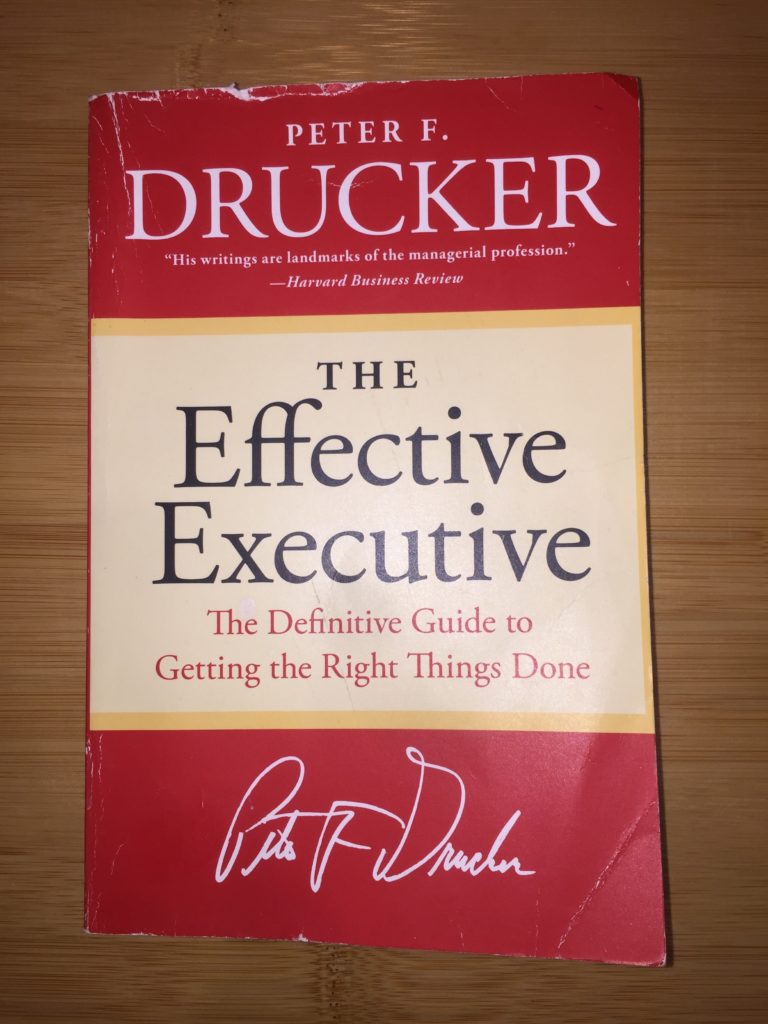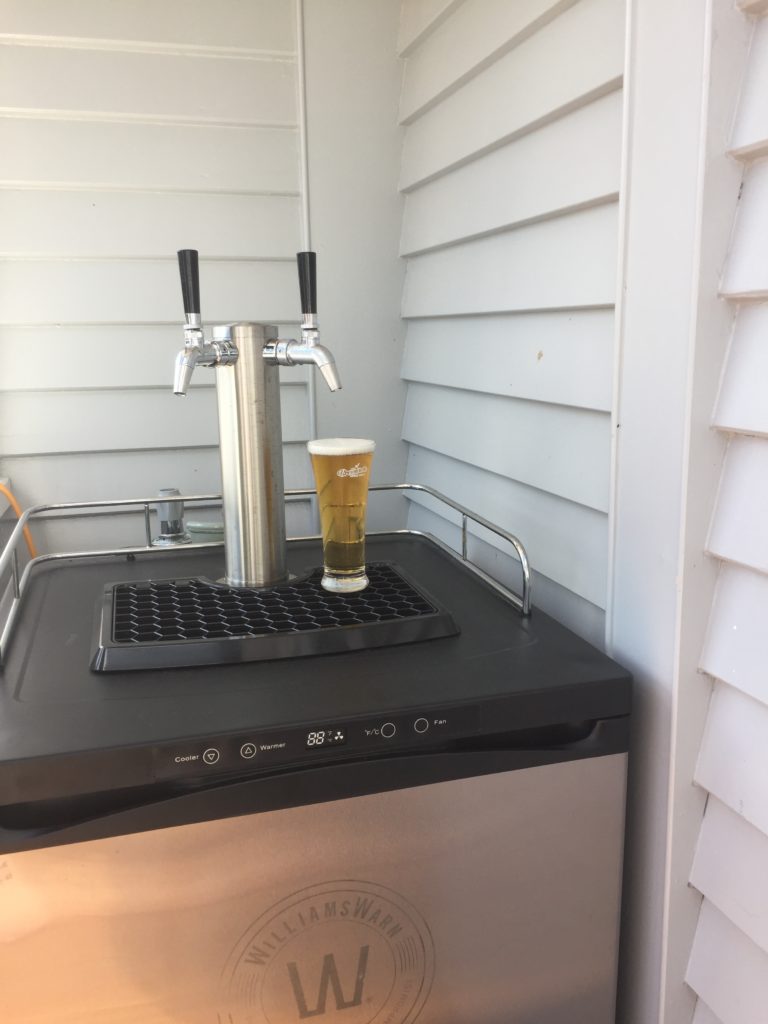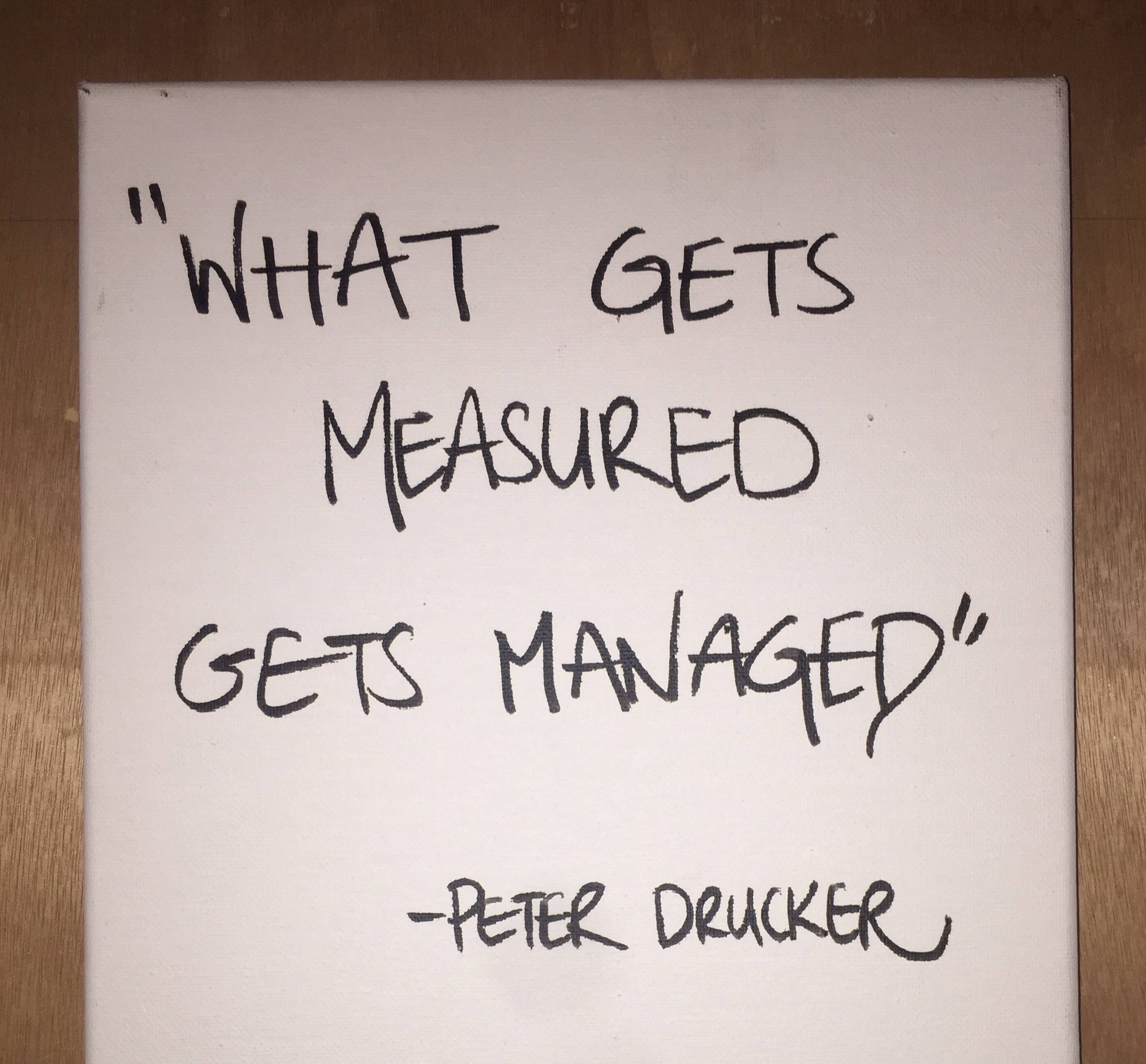Peter Drucker, Management Expert
There is a quote on our wall:
“What gets measured gets managed.”
It looks like I have incorrectly attributed it to Peter Drucker who wrote the classic management book The Effective Executive. It also looks like there is some good debate about how this quote applies to things you can’t measure in business, such as knowledge. That’s a debate for another day; for the purposes of today’s post, the quote works just fine 🙂
In the context of management, what you focus on, and measure, you will naturally manage. As a result, you will most likely compare these results to a target or goal. This is a good thing! We measured sales and profit targets such as food and labour on a daily and weekly basis. As a result, we saw major changes in these areas.
Just comparing the power bill every time it came in is another small but effective example. It took less than 5 minutes but had a flow-on effect to decisions made during the month.
Measuring is not just limited to business either; in fact, late last year I started a beer log.

I love a cold beer.
Now, I am no alcoholic. The last time I drank way too much was my friend’s stag party 6 years ago. I have a self-imposed no-more-than-4-beers rule. I am fit, active, inside my healthy weight range, and I mostly eat well.
WHO put out a massive report last year that changes the guidelines. To be classed as low risk, it’s recommended that you have a no-more-than-3-drinks-in-a-day, with a maximum of 15 in a week, having at least 2 days off a week.
Standard drinks, not total drinks – a 5% Heineken is 1.3 and a 6% craft beer at the pub (425ml) is 2 Standard Drinks!! Use the calculator here.
Just before Christmas, I found myself having 3 – 4 beers a day, multiple days in a row. I decided I wanted to get on top of this habit before it got out of control. The obvious answer would be to just not drink. Of course, I would be willing to do this if it was an absolute must.
But I love a good beer! My mates and I make it from scratch. We have a dedicated keg fridge with fresh, home-brewed craft beer on tap. I enjoy sitting down at the end of a good day’s work and having a cold beer.
The problem is that a couple of beers a day starts to add up. I talked with my wife, and we agreed I either needed to drink less or not at all.

Good Servant, Poor Master
There is an old proverb: “Fire is a good servant but a poor master.” Like many good proverbs, the truth behind it can be applied to many aspects of life.
Money is a good servant but a poor master
Work is a good servant but a poor master.
Technology is a good servant but a poor master.
And…
Alcohol is a good servant but a poor master.
What does it mean to be a servant to something? According to Merriam Webster’s, one of the definitions is “one that is completely subservient to a dominating influence.”
How about what it looks like to be a master? Again, looking to Merriam Webster’s, “one having authority over another and one having control (proved himself master of the situation).”
In regards to drinking beer, I would like to be in control. I do not want to be completely subservient to the dominating influence, feeling, or habit that it’s “time for a beer.”

Identifying the Habits
Are you craving the ______ , or are you craving what it represents. (insert your craving of choice)
Alan Carr spends a large chunk of his book, The Easy Way to Stop Smoking, convincing you that you are addicted to the habit just as much, if not more than you are addicted to the nicotine. He helps you realize that as you are going through the day, there are all these little triggers that make you feel “it’s time for a smoke.” Then, every time you have a smoke, you just reinforce this feeling. If you or someone you know is trying to quit smoking, I seriously recommend the book.
Back to beer, as the end of work day approaches from about 3pm on, the “it’s time for a beer” feeling approaches. After attacking a project on the weekends “it’s time for a beer” feels natural. Some people open the fridge when they are bored while others look at their phone when they find themselves in an awkward situation.
Understanding that you’re driven by habit and routine is important. Identifying the habits and routines first makes it easier to put alternatives into motion.
Just One Day Off
The problem with New Year’s resolutions is that you come out of the gate strong, motivated, and on fire. February rolls around, and life starts to get in the way. If you haven’t addressed the underlying habits, slipping back into old ways becomes a reality. You beat yourself up for a bit, feeling guilty before resigning yourself to accepting it’s “just the way I am.” Sound familiar?
In this podcast, Matt D’Avella interviews Nate Green, a fitness expert & author that advocates a simple approach to well-being. It’s all about “making changes in your life that actually stick,” and it’s worth listening to.
Here are a few excerpts from the start of the interview.
“We know what to do… but we still can’t make a change.”
Think about it.
“How can you shrink the change? How can you make it really easy, to the point where you think this is too easy?”
Once you have picked a goal, ask:
“How confident are you that you can go to the gym 3 times a week? If the client answers anything, 7 / 10 or less, we shrink it. How about 2 days a week; mmmmm, how about 1 day a week? Oh, I could do that, that’s easy. So that’s the habit we start with. That’s the thing we measure for a month – are you consistently going to the gym once a week?”
Rather than saying you’re never going to drink again, lasting 2 – 3 weeks, and then feeling guilty that you had a couple of beers or a wine, set an attainable goal.

Setting Yourself Up for Success
Measuring something you want to change is the first step in change. It’s natural that when you measure something, you start to think about how this measures up with where you want to be. The measurements are unemotional facts that you cannot twist or change.
By identifying the “time for a beer” feelings, it was easy to start planning some alternatives.
Some of the things that helped me were:
– Committing to things in the afternoon, such as a walk, ride, or run,
– Making sure I had alternatives on hand, and
– Drinking lots of water first and then asking, “Do I still feel like a beer?”
Because the goal was not zero beers, it was easy to skip a day and tell myself I can have a beer later in the week. There was still plenty of “time-for-a-beer moments,” but before you know it, one day lead to five and the whole work week had passed without “needing a beer.”
Before Vs After
When I first started recording I was a little shocked to see them adding up. Notice how a few weeks in it already starts to drop.

I got busy before Christmas, missed recording for a few weeks, then went on holiday.
Once I was back to work I got back on the measuring buzz. A 33% reduction so far!

I won’t need to record forever, even just doing this for a short period of time has changed my approach.
Something to think about
How does this apply to you and your business, project or goal?
Is there something you have been wanting to change or improve for a while now? Can you start with measuring your current results as a first step in making change?
What do you feel like you are a slave too? What do you want to change?
For some, it may be doing something more, like exercise or going to the gym. For others, it might be doing something less, like eating chocolate or drinking wine.
What are the habits or routines linked to this?
What time of the day or week does the craving occur? What happens before, what frame of mind are you in?
What’s the smallest immediate step you can take?
Think about a tiny step you can take in the right direction; Can you take one day off? Which day? Commit to that now!
Full disclaimer:
I am not a health professional, and this is my personal opinion on what works for me.
This is not an endorsement to drink less as a way of combating alcoholism. Some people have a natural inclination to not stop drinking once they start. If this is you, I recommend you get the support you need.
This is not an endorsement that if you take illegal narcotics in moderation it makes it ok.
Regarding quitting smoking in particular, Alan Carr actually recommends you don’t try to reduce your consumption whilst reading the book. If you are trying to quit smoking and have failed in the past, I seriously recommend his book.
Links:
http://billhennessy.com/simple-strategies/2015/09/09/i-wish-drucker-never-said-it
https://www.who.int/news-room/fact-sheets/detail/alcohol
https://www.alcohol.org.nz/help-advice/advice-on-alcohol/low-risk-alcohol-drinking-advice
https://cheers.org.nz/drinking-and-your-health/standard-drinks/
https://www.youtube.com/watch?v=wN95JXN435s&t=346s
https://www.merriam-webster.com/dictionary/slave
https://www.merriam-webster.com/dictionary/master
https://www.bookdepository.com/Allen-Carrs-Easy-Way-Stop-Smoking-Allen-Carr/9780615482156
https://www.bookdepository.com/The-Effective-Executive/9780060833459
https://www.alcohol.org.nz/help-advice/is-your-drinking-ok/where-to-get-help

